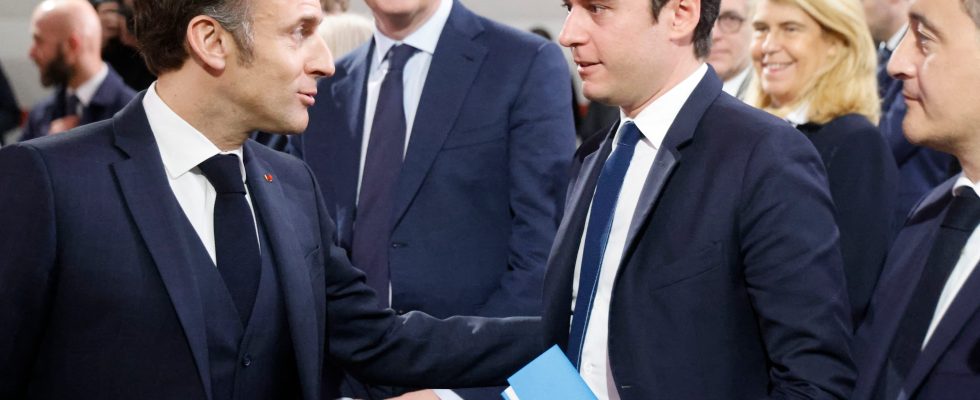The CAC 40 had not experienced such a weekly slap since the invasion of Ukraine by Russia, in February-March 2022. In one week, the Parisian index fell by more than 6%, weighed down in particular by financial stocks, sensitive to changes in interest rates: Société Générale fell by 15%, while Axa, Crédit Agricole and BNP Paribas lost between 11 and 12%. Worried about the French political situation after the high score of the National Rally in the European elections, and especially the announcement of a dissolution of the National Assembly, investors offloaded the securities of large holders of French debt, as well as groups heavily in debt or threatened by the program of Marine Le Pen’s party.
It was in this turbulent context that the leading European asset manager, Amundi, held its major investment forum at the Carrousel du Louvre. Anna Rosenberg nevertheless displays a certain composure in the face of the events taking place in France over the past week. This geopolitical manager of the Amundi Investment Institute, the group’s research center, does not anticipate any major decisions in France by 2027, even in the event that the National Rally comes to power.
L’Express: After the European elections of June 9 marked by the high score of the National Rally and, in the process, the announcement of the dissolution in France, do you identify new risks?
Anna Rosenberg: Regarding the European elections, I do not see any new geopolitical risks. The far right was expected to advance, which it did, but not spectacularly. Above all, it is important to note that the far right is deeply divided at the European level. Its members agree on few economic issues. Some are fiscally frugal, others expansionist. Some are pro-Russian, others are opposed to Russia. The areas of convergence are those linked to immigration and the slowing down of Europe’s green ambition. However, when it comes to immigration, Europe has already tightened its laws significantly in recent years. Regarding green ambition, the major laws have already been adopted. A slowdown in new climate policies is possible, but not necessarily due to the far right since the center right already no longer wanted significant climate regulations.
At the national level, what is new is that for the first time, the European elections have had a national impact in certain countries. In Germany, there will be no big consequences because the coalition was already quite weak. Elections will take place next year with a likely change of government in favor of the center-right party. It was in France that the impact was greatest.
With what consequences in your opinion?
Note that almost all the leaders present at the G7 meetings currently taking place have experienced domestic political problems. In any case, Emmanuel Macron will always deal with major international issues, foreign and defense policy and European issues. There is certainly political uncertainty in France at the moment and anxiety. But there is no fundamental upheaval at this stage. Furthermore, whatever the scenario, we do not anticipate major political decisions between now and the end of the presidential term. Finally, this dissolution could also allow Renaissance to obtain better results in the legislative elections.
What underlies your scenario?
France has strong institutions. In France, the president has extensive powers and does not just lead foreign policy. He appoints top officials and can also delay legislation. I think these factors of stability are underestimated today. Finally, voters vote in greater numbers and sometimes differently in national elections than in European elections.
The National Rally nevertheless appears to be in a position of strength…
At this stage, we believe that no party seems capable of winning an absolute majority and imposing its program. I know that the dynamics are changing a lot and that the far right has established itself in the electoral landscape. However, let’s see what the other political forces are doing. In Germany, the AfD was gaining strength until this meeting in Potsdam, where the leaders of the far right put forward the idea of expelling Germans with immigrant backgrounds. And suddenly we saw massive demonstrations in Germany with people who were usually not politicized.
The financial markets, and in particular the shares of French banks, are reacting negatively. Are these movements excessive?
Investors maintained the hope that there would be more budgetary rigor over the next two years and therefore a reduction in deficits. This hope is dwindling, hence the negative reaction of the stock market. However, this deficit reduction scenario was already unlikely, given the absence of an absolute majority in the National Assembly. We live today in a world of increasing protectionism, costly industrial policies, increased state aid. Finally, a possible return of the Trump administration to the United States would also lead Europe to invest more in defense. But markets are currently falling based on political uncertainty more than fundamentals.
Is the subject of state debt not given enough consideration?
Germany, for its part, has chosen budgetary frugality. In recent years, the country has been faced with multiple difficulties and a challenge to its model based on exports, cheap energy and proximity to Russia. Thanks to its reserves, Germany managed to manage the situation. Good management of budget deficits thus makes it possible to prepare for possible future shocks and crises.
.
